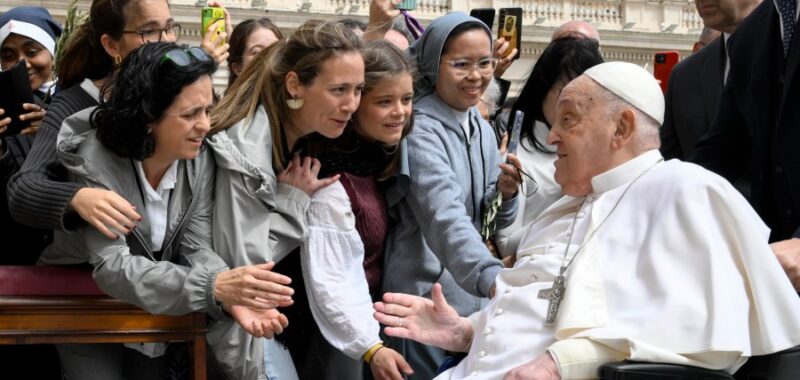
There is an old joke about Jesuits: “A humble Jesuit? A rarity. A Jesuit Pope? An impossibility. A humble Jesuit Pope? A miracle!”
Pope Francis’s pontificate has been both improbable, and in its own way, miraculous. From his first public words, “Buona Sera” (good evening) to the crowds cheering his election and the new pope asking them “to pray to the Lord that he will bless me,” this has been a papacy of surprises.
Francis’s recent 38-day hospitalization for double pneumonia, which included two near-death incidents, is a reminder that his years of leading the Petrine ministry will eventually end. While the world prays this will not happen soon, the 88-year-old Pope acknowledges: “I have lived a long life — longer than my parents, longer than my brothers and sisters.”
Since this column is being published during Holy Week, it is appropriate to reflect upon the legacy of this humble Jesuit pope. That legacy consists of four important pillars.
First, Pope Francis has opened the doors of the Catholic Church wide. Using the pope’s own words, “Todos, Todos, Todos,” he has asked “everyone” to be part of a community of believers.
That message includes those at the margins. Father James Martin, founder of the Outreach ministry for lesbian, gay and transgender Catholics, writes in an email to me that “Pope Francis has done more for LGBTQ people than all his predecessors combined. This is not a knock on any previous popes; rather, it is to say that his pastoral outreach has been nothing short of groundbreaking.”
To all, Francis offers a message of mercy. It is a message that has won him both praise and criticism.
Brian Burch, President Trump’s nominee to be U.S. ambassador to the Vatican, has accused Francis of creating “massive confusion” and engaging in a “pattern of vindictiveness.” He also labeled a central theme of Pope Francis’s pontificate, synodality, as “merely a ruse.” Synodality is defined as “the people of God journeying together and gathering in assembly.”
Countering such criticisms, Steven P. Millies, director of the Bernardin Center and professor of theology at the Catholic Theological Union, in an interview with me, contended that Francis has given Catholics “the tools we need to prepare to be a church of the 21st century.”
Accompanying Francis’s open-door policy and message of mercy is his condemnation of clericalism and his call for Catholic priests to “be shepherds with the smell of sheep.” His Argentinian experiences made Francis into a priest whose mission was centered upon the encounter with anyone who crossed his path. As Cardinal of Buenos Aires, Francis rode the bus to be with the people.
And as pope, Francis has maintained the same simple lifestyle, vacating the papal apartment inside the Vatican and living in the modest quarters of Santa Marta, the Vatican guesthouse. Hitting the road, Francis prefers forgoing limousine rides in favor of a modest Fiat.
A related legacy is Francis’s strong support for the principle of synodality — that is, mandating worldwide listening sessions in Catholic parishes during the past few years. Those sessions resulted in two major conferences held at the Vatican with delegates (including women and the laity) from all over the world.
The topics raised during those meetings included having women serve as deacons, recognizing the dignity and worth of lesbian, gay and transgender Catholics and the need for parishioners and priests alike to become missionaries for social justice and preserving life.
For Francis, synodality is an ongoing development that encourages change from the bottom up rather than the top down. Even from his hospital room, Francis signed a decree authorizing a continuation of the synodal process through the year 2028, something that will be hard, if not impossible, for Francis’s successor to reverse.
A third legacy left by Francis is the power of his persona and the soft power it creates. In many ways, this is an extension of the papacy of St. John Paul II, whose Polish identity electrified those caught behind the Iron Curtain and helped to bring down the Berlin Wall and the collapse of the Soviet empire.
Joseph Stalin’s once mocked the papacy, asking, “How many divisions does the Pope have?” Many, as John Paul II would later show.
Francis’s personality is different from John Paul II’s, yet he draws many to himself. This was readily apparent when millions of people worldwide prayed for his recovery.
Key to Francis’s winning persona is his authenticity. In his autobiography, “Hope,” Francis writes that at the end of existence the question will not be “whether we are believers, but only if we are believable.”
Finally, Francis has ensured that his legacy will not easily be upended.
To date, he has selected a majority of those who will elect his successor, including elevating cardinals from what Francis likes to call “the peripheries.” For example, in December, Pope Francis created 21 new cardinals from Peru, Argentina, Ecuador, Chile, Japan, the Philippines, Serbia, Brazil, the Ivory Coast and Iran.
More appointments will be forthcoming, particularly in the United States, where the cardinals and bishops appointed by John Paul II and Benedict XVI have either retired or are approaching mandatory retirement.
In his memoir, Pope Francis concluded: “At the beginning of my papacy, I had the feeling that it would be brief: no more than three or four years. I never imagined that I would write four encyclicals and all those letters, documents, apostolic exhortations, nor that I would have made all those journeys to more than 60 countries.”
It has been an extraordinary papacy — a papacy of surprises. And more surprises are forthcoming.
John Kenneth White is a professor emeritus at the Catholic University of America. His latest book is titled “Grand Old Unraveling: The Republican Party, Donald Trump, and the Rise of Authoritarianism.” He can be reached at johnkennethwhite.com.

